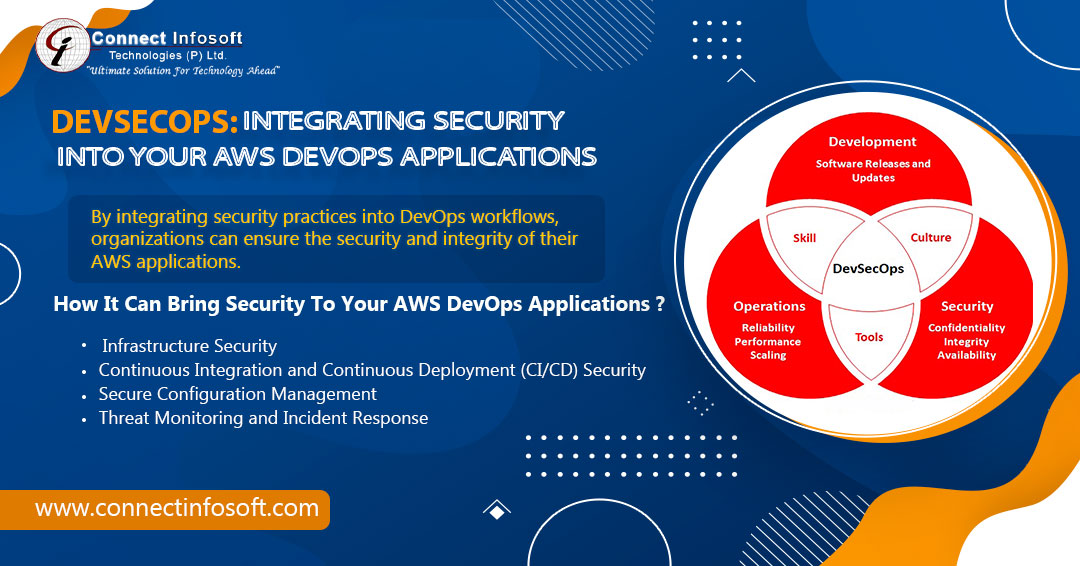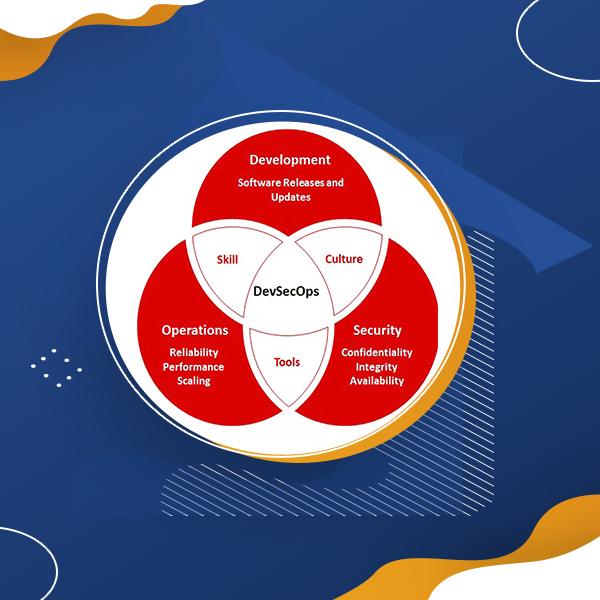DevSecOps: Integrating Security into Your AWS DevOps Applications

In today's world of fast software development and deployment, enterprises are turning to DevOps approaches to shorten release cycles and increase communication between development and operations teams. However, as software development and deployment processes become more agile, security must not be overlooked. This is where DevSecOps comes into play. By integrating security practices into DevOps workflows, organizations can ensure the security and integrity of their AWS applications. Here, we explore the concept of DevSecOps and discuss how it can bring security to your AWS DevOps applications.
1. Understanding DevSecOps:
DevSecOps is an approach that emphasizes integrating security practices into the DevOps lifecycle, making security an integral part of the development and deployment processes. Traditionally, security was often an afterthought, with security measures being implemented at the end of the development cycle or during the deployment phase. DevSecOps, promotes a shift-left mentality, where security is considered from the initial stages of development and is continuously integrated throughout the entire software delivery pipeline.
2. Securing AWS DevOps Applications:
When it comes to AWS DevOps applications, several key security practices can be implemented to ensure the protection of your infrastructure, data, and applications.
Implementing security controls for your AWS infrastructure is vital. This includes employing strong authentication mechanisms, ensuring secure access control policies, and implementing secure network configurations. Utilizing AWS Identity and Access Management (IAM) roles and policies, along with implementing security groups and network ACLs, can help enforce proper access controls and secure your infrastructure.
-
Infrastructure Security:
Implementing security controls for your AWS infrastructure is vital. This includes employing strong authentication mechanisms, ensuring secure access control policies, and implementing secure network configurations. Utilizing AWS Identity and Access Management (IAM) roles and policies, along with implementing security groups and network ACLs, can help enforce proper access controls and secure your infrastructure.
-
Continuous Integration and Continuous Deployment (CI/CD) Security:
Integrating security checks into your CI/CD pipelines is crucial. This involves performing automated security scans, vulnerability assessments, and code analysis during the build and deployment stages. Tools like AWS CodePipeline, AWS CodeBuild, and AWS CodeCommit can be leveraged to automate these security checks, ensuring that only secure code is deployed to production environments.
-
Secure Configuration Management:
Proper configuration management is essential to prevent misconfigurations that could expose vulnerabilities. Utilize AWS Config to monitor and enforce compliance with security configurations. Implement tools like AWS CloudFormation or AWS Systems Manager Automation to automate the deployment of secure configurations, reducing the risk of human error.
-
Threat Monitoring and Incident Response:
Implementing robust monitoring and logging mechanisms is crucial for detecting and responding to security incidents. Leverage AWS CloudWatch, AWS CloudTrail, and AWS Config to collect and analyze logs, monitor for security events, and trigger alerts on suspicious activities. Implement an incident response plan that outlines steps to be taken in the event of a security incident, ensuring a prompt and effective response.
3. Automation and Security Testing:
Automation plays a vital role in achieving effective DevSecOps practices. By automating security testing processes, organizations can identify vulnerabilities, misconfigurations, and compliance issues early in the development cycle. Utilize tools like AWS Security Hub, AWS Config Rules, and AWS Trusted Advisor to automate security checks and provide real-time feedback on security posture. Implementing automated security testing as part of your CI/CD pipeline ensures that security is validated at every stage, reducing the risk of deploying insecure code.
4. Collaboration and Communication:
DevSecOps requires effective collaboration and communication between development, operations, and security teams. Foster a culture of shared responsibility, where security is a collective concern. Encourage regular communication, knowledge sharing, and training sessions to ensure that all teams are aware of security best practices and can contribute to the security of your AWS DevOps applications. Additionally, consider implementing tools like AWS Organizations and AWS Single Sign-On (SSO) to manage access and permissions across multiple AWS accounts, facilitating secure collaboration.
How DevSecOps Benefits AWS DevOps Tools?
DevSecOps brings numerous benefits to AWS DevOps tools by integrating security practices into the development and deployment processes.
DevSecOps enhances the security of AWS DevOps Tools:
- Early Vulnerability Detection: By incorporating security checks into the CI/CD pipeline, vulnerabilities and security issues are identified early in the development process. This allows for prompt remediation and reduces the risk of deploying insecure code.
- Continuous Compliance: DevSecOps ensures that security configurations and compliance requirements are enforced throughout the development lifecycle. Automated security checks and monitoring tools help maintain a consistent and secure environment.
- Reduced Time to Remediation: With security integrated into the development process, vulnerabilities and threats are addressed promptly. This reduces the time required to remediate security issues, minimizing the potential impact on the application and infrastructure.
- Enhanced Scalability and Agility: DevSecOps practices enable organizations to scale their security measures as they grow. Automation and integration with AWS DevOps tools allow for seamless security implementation across multiple projects and environments.
- Regulatory Compliance: By incorporating security practices into the development process, organizations can meet regulatory requirements more effectively. DevSecOps facilitates the implementation of necessary controls and documentation needed to demonstrate compliance.
- Continuous Monitoring and Incident Response: DevSecOps emphasizes the importance of continuous monitoring for security events and incidents. By integrating monitoring tools, teams can promptly detect and respond to security threats, minimizing potential damage.
Building and Auditing Secure Solutions with DevSecOps:
In today's rapidly evolving digital landscape, security breaches pose a significant threat to businesses, their customers, and their reputation. Adopting a DevSecOps approach has become essential for organizations aiming to integrate security seamlessly throughout the software development lifecycle.
- Understanding the principles of DevSecOps and its importance in modern software development.
- Identifying common security vulnerabilities and threats in software applications.
- Implementing security controls and best practices for secure coding and configuration management.
- Automating security testing using tools such as static analysis, dynamic analysis, and penetration testing.
- Integrating security into CI/CD pipelines for continuous security validation and feedback.
- Leveraging containerization and orchestration platforms for secure deployment and runtime protection.
- Establishing governance frameworks and policies to ensure compliance with industry regulations and standards.
- Performing security audits and assessments to identify weaknesses and areas for improvement.
Conclusion:
In the fast-paced world of AWS DevOps, security must be an integral part of the development and deployment processes. DevSecOps provides a framework for integrating security practices into the DevOps lifecycle, ensuring the security and integrity of your AWS applications. By implementing infrastructure security measures, securing CI/CD pipelines, automating security testing, and fostering collaboration, organizations can effectively bring security to their AWS DevOps applications. Embracing DevSecOps not only mitigates security risks but also enables organizations to build and deploy applications with confidence, ensuring the protection of their infrastructure, data, and customers.


